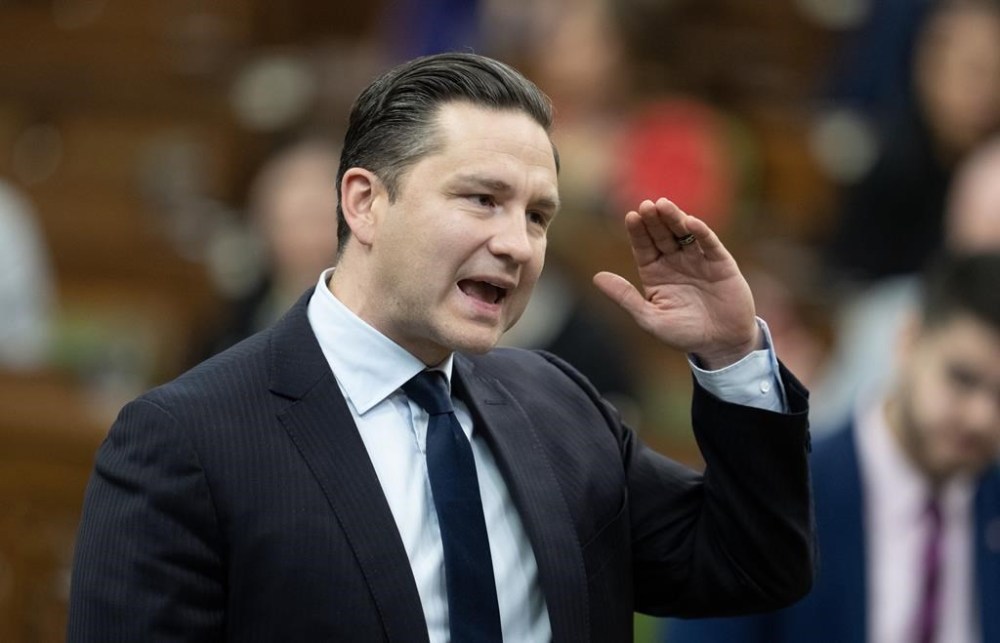Poilievre’s stance on notwithstanding clause concerning
Advertisement
Read this article for free:
or
Already have an account? Log in here »
We need your support!
Local journalism needs your support!
As we navigate through unprecedented times, our journalists are working harder than ever to bring you the latest local updates to keep you safe and informed.
Now, more than ever, we need your support.
Starting at $15.99 plus taxes every four weeks you can access your Brandon Sun online and full access to all content as it appears on our website.
Subscribe Nowor call circulation directly at (204) 727-0527.
Your pledge helps to ensure we provide the news that matters most to your community!
To continue reading, please subscribe:
Add Brandon Sun access to your Free Press subscription for only an additional
$1 for the first 4 weeks*
*Your next subscription payment will increase by $1.00 and you will be charged $20.00 plus GST for four weeks. After four weeks, your payment will increase to $24.00 plus GST every four weeks.
Read unlimited articles for free today:
or
Already have an account? Log in here »
Hey there, time traveller!
This article was published 04/05/2024 (547 days ago), so information in it may no longer be current.
Conservative Leader Pierre Poilievre made political waves this past week when he hinted at the prospect of using Section 33 of the Charter — the so-called “notwithstanding clause” — to protect his proposed justice reforms from judicial review by the courts.
In a speech he gave to the Canadian Police Association on Monday, Poilievre promised to legislate stiffer penalties for convicted criminals and those charged with crimes who have a record of violence. That included more stringent requirements for bail and making it harder for convicted murderers to transfer out of maximum security prisons, according to media reports.
“We will make them constitutional, using whatever tools the Constitution allows me to use to make them constitutional. I think you know exactly what I mean,” Poilievre said.

Should he earn government and make good on that threat, Poilievre’s would be a revolutionary idea, of a kind, considering that in the 42-year history of the Canadian Charter of Rights and Freedoms, no federal government has ever invoked the notwithstanding clause.
In his criticism of the Tory leader’s comments, Liberal Justice Minister Arif Virani said the notwithstanding clause “should be a last option,” rather than a first option.
“We should have a dialogue between the courts and governments before it is ever invoked,” Virani said.
But the minister’s comments seem to dismiss the recent history of the Conservative Party and former prime minister Stephen Harper’s attempt to push through harder justice reforms during his time in office. The fact that so many pieces of Harper-era legislation not only came under judicial review, but were ultimately struck down by the Supreme Court of Canada, should inform any discussion over Poilievre’s remarks this week.
Harper’s attempt to set term limits for senators in the Upper Chamber was thwarted by a Supreme Court ruling in 2014 that the prime minister could not do anything to the Senate without provincial assent.
That same year, the Supreme Court overturned part of Harper’s 2009 Truth In Sentencing Act, which had prevented judges from giving offenders sentencing discounts by multiplying the days spent in pre-trial custody.
And in 2015, the Supreme Court struck down a measure in the 2008 Tackling Violent Crime Act that stated anyone committing a crime with a prohibited gun would get an automatic three years in jail — as the National Post reported, court justices called it “cruel and unusual” punishment.
In fact, by 2022 the CBC reported that three laws creating mandatory minimum sentences had been struck down and another 25 had been struck down in various provinces and territories.
“Taken together, the rulings suggest that Canadian courts are likely to reject future attempts by lawmakers to limit the decision-making power of judges in sentencing, or to enforce blanket approaches to punishment,” the CBC reported.
Hard-right conservatives might well argue that the dialogue that the federal justice minister has called for has already taken place — and Harper’s record proves that they were on the losing end of that discussion. Under the auspices of what they term activist liberal judges overrunning the will of the people, Conservative policy makers may well consider use of the notwithstanding clause the last remaining option at their disposal to keep such laws in the books, however temporarily — for at least as long as a Tory government remains in power.
The recent use of Section 33 by conservative provincial governments in Alberta, Saskatchewan and Ontario — some would describe it as pre-emptively normalizing its use — suggests this as an unspoken reality.
Poilievre’s decision to threaten its use feels more populist in nature than pragmatic, however, as he appears willing to do or say nearly anything to win power. It thus raises the spectre of a cynical national leader who would be willing to use the notwithstanding clause out of political expediency rather than ideological purity. That distinction is arguably more dangerous and unpredictable if we consider how it may be used to subvert other Charter rights in our society.
Even Stephen Harper, after all, stopped short of using Section 33 in the face of perceived Supreme Court overreach.
While he may share Harper’s disdain of the media and of the courts, Poilievre doesn’t appear to have the same scruples.
